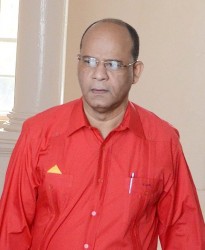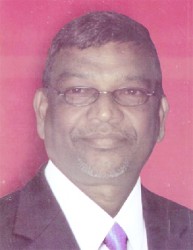People’s Progressive Party (PPP) General Secretary Clement Rohee yesterday testified that Dr Cheddi Jagan and Dr Walter Rodney shared a “healthy relationship” and, although constantly under pressure by the state, neither believed in the use of violence to retaliate.
Rohee, a long-standing member of the PPP, gave his testimony at the continuing Commission of Inquiry (CoI) into the death of Rodney, the Working People’s Alliance (WPA) co-founder who died in a bomb blast on June 13, 1980.


At the time of Rodney’s death, Rohee had been out of Guyana. However, he served with the PPP as a member of the central and executive committees from the years 1978 to 1980. During this time, he said the party had thousands of supporters and had been very prominent in a number of areas in Guyanese life at the time, earning itself the title as a major opposition party to the then-governing People’s National Congress (PNC).
Rohee went on to say that his party shared a close relationship with Rodney and PPP leader Cheddi Jagan had been in constant communication with the historian.
Rohee explained that Rodney and Jagan would meet at Freedom House and would often have “lengthy discussions.” In turn, members of the PPP were briefed on these meetings though they were never allowed to attend, Rohee said.
Rohee also said Rodney and Jagan had some tactical differences in their approaches, such as whether to boycott parliament or campaign against food shortages. Nonetheless, they were generally in agreement and had a broad vision of what they wanted, he said.
Rohee said their common goal was to bring about much-needed political change and improve the livelihoods and well-being of the working people. “I don’t think there were any fundamental differences in their ideologies…these men came from two different backgrounds but there was one basis with them,” Rohee said.
Furthermore, Rohee maintained that violence was never presented by either Rodney or Jagan as a method of achieving their goals. Instead, he said, they worked towards influencing people and organisations they worked with. “I’ve always heard them speak about mobilising the people, getting the people to come out, to demonstrate,” Rohee said.
Rohee also said he had personal interactions with Rodney and testified that Rodney’s presence was one that gave the reassurance that he was serious about what he was pursuing. He opined that Rodney arrived on the political scene at a time when the economic, political and social scenes were particularly grave in Guyana and the time had been “ripe” for what he had been advocating for. “All the conditions of the country were ripe for the kind of struggle he was advocating for,” Rohee said. He continued, “He was advocating for mass, political struggle…he was convinced that the situation, as it existed, and the rising political consciousness of the people would–if given the right political leadership–all of this would work towards the removal of the PNC; that was his vision.”
State Surveillance
In addition to investigating the circumstances of Rodney’s death, the Commission is mandated to examine state surveillance of the political opposition from 1978 to 1980.
During his time on the stand, Rohee said the PPP and the WPA faced serious surveillance, which saw around the clock monitoring by agents of the state. He said he had personally experienced this surveillance, both at his home and at the PPP’s headquarters Freedom House. He said there would be persons standing opposite Freedom House and not too far from the building day after day. These persons, he said, were there at all times and would be seen taking notes.
Rohee said he was also aware of other PPP members, such as Jagan, being under surveillance.
Rohee added that there were a number of men who would rotate on a shift basis and surveillance would extend to all areas of life.
Rohee explained that on one occasion he confronted one of the men in front of Freedom House. The man, he said, left but subsequently returned. Rohee also said on trips out of the country men would be waiting for him at the airport. He described how he was searched, questioned, and had some of his items taken away, never to be returned to date. He said that the men who questioned never identified themselves although he noted that he is now working with some of these men.
Furthermore, he said he had noticed at least on one occasion a man on a motorcycle taking photos of his home, while surveillance also extended to public meetings. Rohee explained that he would witness men taking photos of persons during meetings and these individuals were not known as reporters with established news entities. Rohee said he was also followed around by persons who would stand close by and listen in on his conversations with others.
In regards to Jagan, Rohee said he was also under surveillance “beyond a shadow of a doubt.” Rohee said on occasion he would travel with Jagan and would notice men following him from home all the way to Freedom House. The men would then establish themselves outside of Freedom House for the duration of the day.
Rohee said he did not know at the time who these persons were but suspected that they were members of the Police Special Branch. He further said these persons were not supporters of the PPP and he knew they had been sent to conduct “surveillance and espionage.”
Rohee said the suspicion that the men were from a state agency came from his observations of their attire and behaviour. He said that his suspicion was later confirmed when he became the Minister of Home Affairs.
‘Raw violence’
Meanwhile, Minister of Labour Nanda Gopaul was also cross-examined yesterday before Minister Rohee took the stand and both men told the inquiry that the House of Israel had been a part of state-sponsored violence against Rodney and the WPA.
Gopaul even went so far as to compare the House of Israel to “the goon squad.”
Gopaul explained that “raw violence” was used by the House of Israel, with Rodney being the target of it. Gopaul said he had witnessed occasions where Rodney’s microphone and public address (PA) system would be taken away before he could even address those that had gathered to listen to him. Gopaul said those who had taken away the equipment had been persons from the police force and the private militia, including the House of Israel.
He emphasised that their presence was simply to disrupt Rodney’s speeches. He added that other speakers were not interrupted but when it was time for Rodney to take the stand the disrupters would spring into action.
“The House of Israel people were like what we addressed as goons in those days; they were part of the goon squad that would break up meetings,” Gopaul said. He continued, “The breaking up of that meeting was ruthless; absolutely ruthless. I have not witnessed violence of that nature before unleashed on Guyanese by members of the police force and members of the House of Israel.”
He further said the attacks were all a part of the state’s aim to oppress persons who stood up for the rule of law and democracy and Rodney’s subsequent death led him to conclude that the state and its arms had a hand in the man’s death.
Similarly, Rohee testified that the House of Israel was involved in “political violence” along with the PNC and he believed that the former was protected by the governing party.
Rohee said this protection afforded House of Israel members the ability to carry firearms and though he saw these members with weapons, he said they were not seen openly.
Rohee said that he would recognise the House of Israel members by their dashikis, while other agents of the state were recognisable by their outfits. He added that he knew the House of Israel was a part of the state due to his experience in the country then.
Rohee also said that the state had been responsible for sanctioning the breakups of groups and had sponsored violence by attacking and killing Rodney’s associates such as Ohene Koama. Further, he said Guyanese were denied a number of rights, including the freedom of expression, movement and even life. Rohee recalled one incident in front of the Georgetown Magistrates’ Courts in 1979, the day that he believed Father Bernard Darke was killed. Rohee said that he believed Darke had been attacked and stabbed to death by a House of Israel member who had specifically been targeting him.
Rohee testified that a huge crowd had turned out and he had been on the scene as well. However, pandemonium broke out, he said, and the people scattered as members of the House of Israel attacked. According to Rohee, persons began running because “terror had been unleashed.”
“These people [the House of Israel members] were attacking from all directions. They were strategically placed,” Rohee said. He further said that the way the attack happened led him to believe that someone had given a signal that it was time to move. “All of them moved at the same time,” he added.
Rohee further said that Darke had been running behind him and was closely pursued by a House of Israel member. Rohee also said he did not see when Darke was pounced upon by his pursuer and he later learnt that the priest had been stabbed to death.
Rohee concluded that Father Darke’s death was an act of state terrorism, executed by its sponsored body the House of Israel.
Rohee is expected to be cross-examined when the commission resumes its hearings in February. Rodney’s brother, Donald Rodney, is expected to take the stand today following his arrival in Guyana last night.
He had been reported as the person who had been with Walter Rodney on the night of his death.








